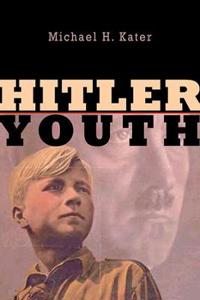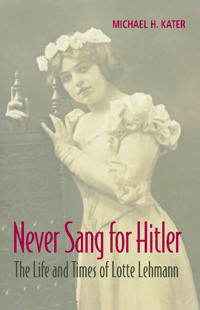The Twisted Muse (Häftad)
avMichael H. Kater
ISBN: 9780195132427 - UTGIVEN: 1999-05Is music removed from politics? To what ends, beneficent or malevolent, can music and musicians be put? In short, when human rights are grossly abused and politics turned to fascist demagoguery, can art and artists be innocent? These questions and their implications are explored in Michael Kater's b[...]
Weimar (Inbunden)
avMichael H. Kater
ISBN: 9780300170566 - UTGIVEN: 2014-09Historian Michael H. Kater chronicles the rise and fall of one of Germany's most iconic cities in this fascinating and surprisingly provocative history of Weimar. Weimar was a center of the arts during the Enlightenment and hence the cradle of German culture in modern times. Goethe and Schiller made[...]
Never Sang for Hitler (Inbunden)
avMichael H. Kater
ISBN: 9780521873925 - UTGIVEN: 2008-06-01Both a narrative of Lehmann's life and an analysis of the artist and society.
Hitler Youth (Häftad)
avMichael H. Kater
ISBN: 9780674019911 - UTGIVEN: 200605In modern times, the recruitment of children into a political organization and ideology reached its boldest embodiment in the Hitler Youth, founded in 1933 soon after the Nazi Party assumed power in Germany. Determining that by age ten children's minds could be turned from play to politics, the regi[...]
Never Sang for Hitler (Pocket)
avMichael H. Kater
ISBN: 9781107675049 - UTGIVEN: 2014-06Lotte Lehmann ranks among the most celebrated singers of the twentieth century. She was a favorite of Richard Strauss, and also had a famous encounter with Hermann Goring, in which he claimed to want to make her the foremost singer in Nazi Germany. By the time of her final performance in 1951, she w[...]
Das "Ahnenerbe" Der SS 1935-1945 (Häftad)
avMichael H. Kater
ISBN: 9783486579505 - UTGIVEN: 2006-03Standardwerk der NS-Forschung: Die Schutzstaffel Heinrich Himmlers entfaltete wahrend des Dritten Reiches hochste Aktivitat, und das nicht nur als Agent totalitarer Machtvollstreckung. Kater zeigt, dass die SS den ernsthaften Versuch einer Infiltration des deutschen Kultur- und Geisteslebens unterno[...]








